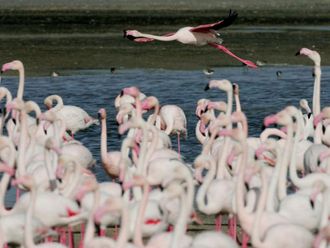Abu Dhabi: Because of the threat of extinction facing sharks globally, there is an extremely urgent need for the waters of the Gulf to be allocated as shark sanctuaries, an international marine expert told Gulf News.
About 25 species of shark inhabit the Gulf waters, and if the current rate of global overfishing continues, there could be disastrous effects on the ecosystem, said Liz Mclellan, manager of species programme at the World Wildlife Fund for Nature (WWF) International.
"Sharks are the top predators in most marine ecosystems. A drastic reduction in their numbers therefore threatens the health of many other species too. In the waters of the Gulf for example, decreasing numbers of reef sharks, which are already pressured, could compromise the health of coral reefs," Mclellan said.
She was a speaker at the Marine Conservation Forum 2010 held in the capital last week, where international experts met with regional environmental groups and government officials to discuss threats to marine species in the Gulf.
Globally, 73 million sharks are killed a year for the fin trade, and this volume of commercial fishing is a huge threat to sharks.
Because sharks reproduce after reaching 12-13 years of life and give birth to only four or five live offspring which they then nurture, shark numbers cannot bounce back quickly if depleted.
Mclellan said that in addition to harming the local ecosystem, shark overfishing could also harm the economies of various communities.
"In the North Atlantic, shark overfishing led to an abundance of rays, which then predated on the scallops that the local population used to fish for their livelihoods," she said.
"We therefore need action at the policy level by regional governments so that these waters can be converted into shark sanctuaries. None of the Gulf countries have signed the international Convention of Migratory Species agreement for shark conservation, and this could be an important step," she added.
Susan Lieberman, director of international policy at the Pew Environment Group, also told Gulf News that there was evidence shark fishing occurred regionally for the purposes of the fin trade, although its scale was as yet undetermined.
"Sharks are fished so that people can have fin soup, but this food itself has no nutritional value. In fact, these fish may be much more valuable alive because they are useful for eco fishing, in which people dive and observe them in their natural habitats," she explained.
Predators: Decline threatens other species too
- 590 - known shark species worldwide
- 40 - species throughout the Middle East
- 25 - species in the Arabian Gulf
Source: Pew Environment Group
How do you think this will affect the region's fishing industry? How else can the UAE prevent over fishing?












